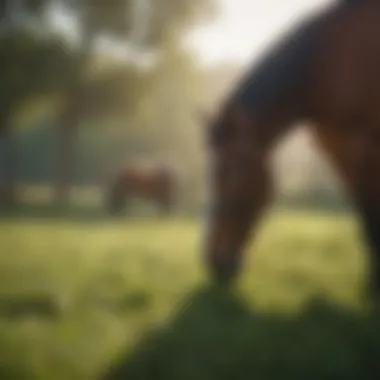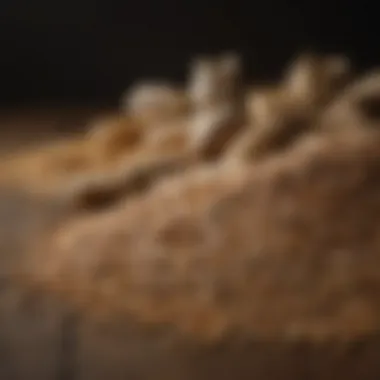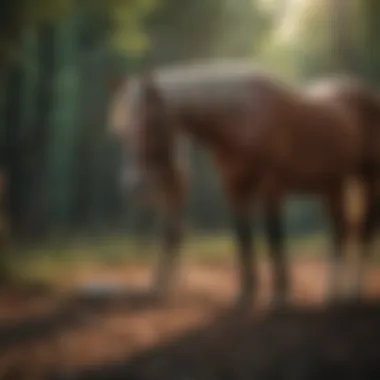Essential Nutritional Needs of Horses Explained


Intro
When it comes to providing top-notch care for horses, understanding their nutritional needs is paramount. These magnificent creatures rely heavily on the right balance of food and supplements to thrive, and every horse owner must get a grip on what that entails. Nutrition plays a huge role in not only their physical health but also their overall well-being.
With so many choices out there, it's easy for horse owners to feel swamped. From forages to grains and specialized supplements, each component contributes to the horse's health in its own way. This article explores the essential dietary elements horses require, breaking it down into digestible sections, making it easier for both seasoned equestrians and newer horse lovers to navigate the world of equine nutrition.
In this guide, we will delve into the various nutritional components that are crucial for every stage of a horse's life. Whether it’s a sprightly young colt or a noble older mare, understanding the specific dietary needs makes all the difference in guaranteeing a healthy equine partner.
So buckle up; we’re about to take you on a ride through the essentials of horse nutrition.
Understanding Equine Nutrition
Equine nutrition forms the backbone of a horse's health and longevity. Just as one wouldn’t expect a high-performance race car to run on low-grade fuel, a horse similarly thrives on a thoughtfully constructed diet. The way a horse processes nutrients can greatly influence its energy levels, overall wellness, and even its temperament. Bad eating habits or a lack of understanding in the nutritional needs can lead to serious health risks, so it's no small matter.
The Importance of Nutrition
Getting nutrition right can be the difference between a vibrant horse and one that’s lethargic or prone to illness. To put it plainly, if a horse's diet doesn't fulfill its nutrient needs, issues like poor coat condition, weight problems, and digestive distress can creep in. Nutrition isn't just about keeping a horse alive; it's also about promoting a full and active life.
Moreover, understanding equine nutrition allows owners to tailor diets based on specific needs—be it for young horses that are still growing, performance horses that require extra energy, or older horses that may have different digestive capabilities. The right mix of nutrients not only supports daily functions but also enhances recovery from work or injury.
Basic Nutritional Components
A holistic view of equine nutrition involves considering both macronutrients and micronutrients, each playing a crucial role in a horse’s diet.
Macronutrients
Macronutrients, such as carbohydrates, proteins, and fats, serve as the primary energy sources for horses. Carbohydrates, found in forages and grains, are crucial for fuel. Proteins, meanwhile, are needed for growth and tissue repair. The unique feature of macronutrients is their role in directly influencing a horse’s energy levels and performance capabilities.
- Key Characteristic: Macronutrients offer immediate energy, crucial for working horses needing stamina during rides or competitions.
- Benefits: They allow horses to maintain their physical condition and engage in demanding work.
- Disadvantages: Too much can lead to weight gain and associated health problems, like laminitis, especially if hay is low in quality or if grain is fed in excess.
Micronutrients
While macronutrients take center stage for energy, micronutrients—vitamins and minerals—are the unsung heroes in a horse’s diet. These are essential for maintaining various physiological functions, including immunity and recovery processes. Often overlooked, micronutrients can influence everything from hoof quality to reproductive health.
- Key Characteristic: They are required in smaller quantities but are vital for optimal bodily functions.
- Benefits: They support metabolic processes, enhance bone strength, and can even improve coat condition.
- Disadvantages: A deficiency might not show symptoms immediately but can lead to chronic health problems over time.
In summary, understanding these basic components is essential for creating a balanced and effective diet. Some may think it’s enough to simply throw some hay and oats together, but the real art of nutritional management lies in recognizing the specific needs of each horse and adjusting accordingly.
Forage: The Foundation of a Horse's Diet
Forage forms the backbone of equine diets, serving as the primary source of nutrients a horse needs to thrive. It's not just about keeping a horse's stomach full; the type and quality of forage directly influence health, behavior, and performance. Horses are naturally grazers, and their digestive systems are designed to break down fibrous plant material found in forage.
Types of Forage
Grass
Grass is a staple in many horse diets and is often regarded as the most natural form of forage for them. It is rich in fiber, making it essential for digestive health. One of the key characteristics of grass is its high moisture content, which can aid in hydration. Its fresh, lush nature offers a variety of vitamins, minerals, and other nutrients that horses need.
While grass may be highly beneficial, its availability can be seasonal and vary by region. Some horses, especially those that are prone to weight gain or certain health issues, might not do well on too much rich grass. Careful monitoring of their intake is crucial to avoid conditions like laminitis.
Hay
Hay serves as a practical substitute for grass when pastures are scarce or not lush enough. It undergoes drying processes that preserve nutrients, and it comes in various types like timothy, alfalfa, and orchard grass, each providing different benefits. For instance, alfalfa is protein-rich and can be great for young, growing horses or those that are working hard.
Additionally, a well-cured hay contains essential elements to support digestive health, and horses often enjoy it due to its aromatic nature. However, hay can vary significantly in quality; moldy or dusty hay can lead to respiratory problems and other health issues, so selecting high-quality hay is key to maintaining optimal health for your horse.
Silage
Silage, while less common than grass or hay, can be used in horse diets, particularly in certain regions of the world. It involves fermenting fresh forage and can be an excellent source of energy, especially during the colder months when other forage may be less available.
One of its key benefits is its higher digestibility compared to dried forages, making it easier for horses to extract necessary nutrients. However, silage can also be high in acidity, which may not suit every horse. It's also essential to ensure that silage is stored correctly to prevent spoilage, as poor storage can lead to dangerous molds or bacteria.
Benefits of Forage Consumption
Forage consumption brings numerous benefits to horses, including:
- Enhanced Digestive Health: Regular intake of fiber-rich forage helps maintain a healthy gut, preventing issues like colic.
- Natural Behavior: Grazing mimics natural behaviors and keeps horses mentally stimulated, reducing unwanted behaviors like cribbing or weaving.
- Weight Management: Forage can help control weight as it provides bulk without excess calories, especially when high-calorie concentrates are minimized.
- Dental Wear: Chewing fibrous forage naturally helps maintain dental health, promoting proper wear of their teeth.
As horse owners, paying close attention to forage quality and types is crucial. A diet rich in various forages supports overall health, performance, and longevity for our equine companions.
"A horse's diet is a mirror reflecting its health; nourish it well."
For horse owners, understanding forage is more than a duty – it's a commitment to their well-being.
Grains and Concentrates in Equine Diets


Grains and concentrates play a pivotal role in a horse’s diet and understanding their importance can make a world of difference in your horse's health. While forage serves as the backbone of equine nutrition, grains provide an energy boost that is crucial, especially for active or working horses. Grains are dense in calories, and when properly incorporated into a horse's regimen, they can help achieve optimal performance.
When discussing grains, one should remember the balance. Too much of a good thing can lead to issues such as obesity or metabolic disorders. Correct portioning and selection of the right grains ensure that your horse isn’t just getting calories; it’s getting the nutrition it needs. Furthermore, concentrates like grains can help enhance a horse's health in specific situations, such as during heavy training, recovery from illness, or in the case of lactating mares.
Types of Grains
Oats
Oats are like the bread and butter of grains for horses. They're easily digestible and provide a good amount of fiber. The high fiber content is great for gut health, making oats ideal for maintaining a balanced digestive system. One notable characteristic of oats is their high energy content, which is essential for horses that need extra fuel for vigorous activities.
Its unique feature lies in its low sugar content compared to other grains, which can be a boon for horses prone to weight gain or insulin resistance. However, they are not as calorie-dense as some alternatives, which means it's crucial to consider each horse’s overall diet when including oats. The balance should be struck, ensuring that oats complement forage without compromising overall caloric needs.
Barley
Barley stands out due to its high starch content, another wonderful source of energy. This grain is often favored for horses engaged in heavy work. The key characteristic of barley is its heating effect—this grain can help warm the horse up during colder seasons or when they require more metabolic output.
The unique feature of barley is its hull; it retains its outer layer, which could act as a great source of fiber. However, that hull can also complicate digestion if not processed. This means that while barleys is a beneficial choice for hardworking horses, owners must be diligent in selecting properly rolled or crushed barley formulations to prevent digestive troubles.
Sweet Feed
Sweet feed is often a popular choice, especially amongst horse owners looking to provide a palatable option for their offspring or picky eaters. This mixture generally consists of grains like oats, barley, and corn, all sweetened by molasses. The primary benefit of sweet feed lies in its appealing flavor, making it easier to get horses to eat the nutrients they need.
A unique aspect of sweet feed is its added vitamins and minerals, often included to round out its nutritional profile. However, one must approach sweet feed with caution. The high sugar content may lead to issues like hyperactivity or change in behavior, especially in sensitive horses. It’s wise to keep a close eye on the overall dietary composition to ensure that sweet feed doesn’t lead to unintentional weight gain or other metabolic issues.
Role of Concentrates
Concentrates are more than just extras; they hold essential nutrients that a horse needs, especially when forage alone may not suffice. For working horses, the role of concentrates is even more pronounced. Concentrates provide energy that helps with physical exertion and recovery.
In the blending of grains, there’s often room to include protein sources and fat, offering a well-rounded approach to nutrition. With the right concentrates, horse owners can ensure that they’re not just fueling their horses, but also supporting muscle repair, growth, and overall health.
Remember, the best approach to equine nutrition is a tailored one—what works for one horse may not work for another. Continuous assessment and adjustments can yield better results than a one-size-fits-all plan.
The Role of Supplements
When it comes to the well-being of your horse, supplements can play a pivotal role in filling the gaps that diet alone might miss. They serve as an essential addition to equine nutrition, especially considering the varied needs across different life stages, activity levels, and health conditions. Just like us humans take multivitamins to bridge nutritional gaps, horses also benefit from supplements to ensure they receive optimal nourishment.
The importance of supplements can't be overstated. In an ideal world, a horse would get all necessary nutrients from its feed, but this isn't always practical. Various factors such as soil quality, forage types, and even seasonal changes can affect nutrient availability. Therefore, making smart choices about supplementing can add significant value to the horse's overall health and performance. However, choosing the right supplement requires careful thought and should be informed by a horse’s specific needs.
Types of Supplements
Vitamins and Minerals
Vitamins and minerals are the unsung heroes within equine diets, crucial in supporting many bodily functions. They contribute to immune function, metabolism, and bone health, which makes them a popular choice among horse owners. The unique feature of vitamins and minerals is their ability to work synergistically, meaning that they can enhance each other's absorption and effectiveness. For example, calcium and phosphorus are two minerals that need to be in the right ratio for optimal health.
However, over-supplementation is a double-edged sword. Too much of certain vitamins can lead to toxicity, while deficiencies can lead to serious health issues. Hence, ensuring the right balance is paramount.
Probiotics
Probiotics are another interesting addition to the mix. These beneficial bacteria help maintain gut health and improve digestion, which is essential for nutrient absorption. The key characteristic of probiotics is their ability to enhance the gut flora, making them an attractive choice for horse owners aiming to boost their horse's digestive health.
One advantage of including probiotics in a horse's diet is that they can help alleviate issues such as colic and diarrhea. On the downside, not all horses react the same way to probiotics, and their effectiveness can vary, so it's wise to monitor your horse's response when introducing them into their diet.
Joint Supplements
Joint supplements are particularly important for working horses or those involved in competitive sports. They typically contain ingredients like glucosamine or chondroitin, which help in maintaining joint health and mobility. Notably, the key characteristic of joint supplements is that they can help mitigate the wear and tear caused by rigorous activity, making them a beneficial choice for active equines.
The unique feature of joint supplements is their preventive approach. They are often used as a measure to prevent joint issues before they arise rather than merely treating existing problems. However, the effectiveness can depend on the quality of the product and the individual horse’s needs, leading some owners to feel the need for more research or veterinary advice before starting them.
When to Use Supplements
Timing is crucial when it comes to implementing supplements into your horse's diet. Not every horse will require supplementation at all times. Generally, it’s wise to consider supplements during periods of increased exercise, recovery from illness, or significant life changes, such as pregnancy. Conducting regular health checks can provide insights into whether a supplement might be beneficial or necessary. Entirely cosmetic reasons should be avoided—always focus on the horse’s health and well-being.
“Supplementation isn’t a one-size-fits-all approach; it’s about responding to your horse's unique needs.”
Nutritional Needs Based on Life Stages
When it comes to the welfare of horses, their nutritional needs can vary significantly at different life stages. This topic is crucial not just for maintaining their health, but also for ensuring that each life phase is supported adequately. By honing in on these specific requirements, owners can greatly enhance their horses' performance, longevity, and overall well-being. Each group—young horses, working horses, and senior horses—has distinct needs that should be addressed to promote health and vigor.
Young Horses
Young horses, particularly foals and weanlings, have nutritional demands that are quite elevated. During this critical growth period, they require a well-balanced diet rich in essential nutrients. Their skeletal and muscle development hinges on adequate intake of protein, minerals, and vitamins. Typically, young horses should be fed a diet that's higher in protein compared to adult horses to support their rapid growth.
Key Considerations for Feeding Young Horses:
- Protein Sources: High-quality forages and grains, particularly those like alfalfa, can be beneficial.
- Minerals: Pay attention to calcium and phosphorus levels, as these are vital for bone health.
- Frequent Feeding: Since their stomachs are smaller, offering multiple smaller meals throughout the day can help aid digestion.


The consequences of under-feeding or improperly balancing their diet can show up as stunted growth or developmental orthopedic issues, which can lead to long-term problems. Proper nutrition lays the foundation not just for healthy adults but for the performance capabilities they will exhibit later.
Working Horses
Working horses, whether engaged in competitive sport or farm labor, have increased energy and nutrient requirements. Their diets should be designed to fuel their activity level while also supporting recovery. The balance between carbohydrates and proteins becomes paramount here, as these two macronutrients play a critical role in performance and recovery.
Nutritional Strategies for Working Horses:
- Carbohydrate Focus: Incorporating grains like oats or barley can provide the necessary energy.
- Electrolytes: Consider adding electrolyte supplements during hot weather or after intense exertion to maintain hydration and electrolyte balance.
- Quality Forage: Ensuring access to high-quality hay can assist in maintaining gut health and provide necessary fiber.
An insufficient diet for working horses can result in fatigue, decreased performance, and even long-term health issues, thus making it imperative for owners to fine-tune their horses' diets based on their workloads and individual requirements.
Senior Horses
Senior horses often require a different set of dietary considerations as they age. With changes in metabolism, dental health, and gastrointestinal function, their nutritional needs can shift quite dramatically. More than before, the focus is on easily digestible feeds and maintaining a healthy weight, adjusting their intake as needed to avoid the common pitfalls of obesity or sudden weight loss.
Feeding Guidelines for Senior Horses:
- Soft Feeds: Moistened feeds or easy-to-chew pellets can aid those with dental issues.
- High Fiber Diets: The inclusion of more fiber can help prevent digestive disturbances, which are more common in older horses.
- Joint Health: Supplements for joint support may be beneficial due to wear and tear that comes with age.
Maintaining a balanced approach while acknowledging their unique issues can help ensure that senior horses enjoy their twilight years without the burden of significant health problems.
Keeping an eye on their body condition score and adjusting diets accordingly can help craftsmen avoid the complications that arise from underfeeding or overfeeding.
Common Nutritional Deficiencies
Nutritional deficiencies can sneak up on horse owners before they even know it. Horses rely on a balanced diet to thrive, and when they don't receive essential nutrients, it can create quite a storm under the surface. These deficiencies can lead to a range of health issues, impacting a horse's overall condition and performance. Understanding these common deficiencies can be a game changer for any horse owner. It’s not just about feeding oats and hay; it’s about ensuring that the diet covers all bases.
Identifying Deficiencies
Identifying nutritional deficiencies in horses is a nuanced art. Unlike humans, horses can't tell you when they're feeling off. Instead, keen observation becomes the best guide. Some signs to look for include:
- Changes in coat quality: A dull or rough coat can indicate a lack of essential fatty acids or vitamins.
- Weight fluctuations: Rapid weight loss or gain can signal underlying nutritional issues.
- Behavioral changes: A horse that appears lethargic or unusually irritable might be missing vital nutrients.
- Digestive issues: Frequent colic or changes in manure consistency can point to dietary deficiencies, particularly in fiber.
Regular veterinary check-ups, along with a thorough assessment of the horse's feed, can help spot these deficiencies early. It's not just about what they eat but also how well they utilize the nutrients from their food.
Effects on Health
The repercussions of nutritional deficiencies can be severe and varied. Horses that don’t receive the right balance can suffer from numerous health problems. Here are some of the common effects:
- Weakened immune system: A horse lacking in vitamins, particularly Vitamin E and selenium, can find themselves more susceptible to illness.
- Poor muscle development: Deficiencies in protein and certain minerals like calcium can lead to muscle wasting or even developmental issues in young horses.
- Reproductive issues: A lack of key nutrients can affect fertility, making it challenging for mares to conceive or carry a foal to term.
- Bone health concerns: Without proper access to minerals like calcium and phosphorus, a horse’s bones may weaken, leading to complications like fractures.
In short, being vigilant about a horse's diet and keeping an eye out for these signs can save a lot of trouble down the line. Ensuring a balanced intake of nutrients is crucial, particularly in shaping a horse's long-term health and performance.
"An ounce of prevention is worth a pound of cure." In the world of equine care, this saying rings true. Monitoring a horse’s diet and understanding their nutritional needs can go a long way in maintaining their overall health.
Factors Influencing Dietary Requirements
Understanding the specific factors that influence a horse’s dietary requirements is key to ensuring their health and longevity. These factors can vary significantly and have different implications on how a horse needs to be fed, ultimately affecting their performance, growth, and overall well-being. By delving deeper into these aspects, horse owners can make more informed decisions that align the horse's nutritional needs with its active lifestyle and medical needs.
Activity Level
The first factor that comes to mind is activity level. Horses are not all cut from the same cloth; some are jumpers, others may be dressage stars and some may just prefer to saunter around the pasture. Each of these levels of activity requires a unique dietary approach.
- High Activity: For horses involved in rigorous competition or extensive training, their energy requirements significantly increase. These horses often need more calories, leading to a diet richer in carbohydrates and fats. Supplements might also become necessary here.
- Moderate Activity: Horses that engage in moderate work might not require as many calories. Adjusting their grain intake and ensuring adequate forage will suffice.
- Low Activity: Horses with a laid-back lifestyle require less energy – a common oversight among new horse owners. Focusing on maintaining a balanced diet while avoiding excessive grain is essential to prevent obesity.
Understanding your horse’s daily routine and adjusting its dietary intake accordingly can prevent issues down the line, be it through weight gain or deficiencies. Tracking activity can seem daunting, but simply noting hours worked or type of exercise each week can help fine-tune their diet efficiently.
Breed Variations
Next up, breed variations play a pretty big role in determining dietary needs. Each breed comes with its own characteristics, body composition, and predispositions toward certain health problems.
- Draft Breeds: Breeds like Clydesdales or Percherons tend to be heavier and often need higher calorie diets due to their size and strength requirements.
- Arabian Horses: These horses are typically leaner and can thrive on less concentrated feed. They may benefit from higher intakes of forage due to their digestive system.
- Thoroughbreds: These athletes often require higher levels of protein and carbohydrates to sustain their intense training schedules.
A good keen observation of how different breeds respond to their diets can make all the difference. It's not enough to simply provide the same feed for every horse; tailoring diet plans to breed specifics will capture the essentials needed for each unique horse.
Health Conditions
Health conditions are another significant factor influencing a horse's dietary needs. The nutritional requirements of a healthy horse and one with health issues differ greatly.
- Conditions like Colic or Founder: Horses that have faced these issues may require special diets that reduce the risk of recurrence. For example, a low-carb diet can be crucial to manage such conditions.
- Older Horses: Senior horses often deal with dental problems that inhibit their ability to chew effectively. This can necessitate forming a softer diet to facilitate swallowing and digestion.
- Metabolic Issues: Horses on the smaller side can sometimes experience metabolic issues where managing sugar and starch intake becomes paramount for their health.
It's essential to monitor any changes in behavior or health and to seek veterinary advice regarding any necessary dietary adjustments. The right strategy can go a long way in keeping your horse tip-top.
Nourishment goes beyond just filling a trough; it’s about picking the right morsels that cater individually to each horse's needs.


By acknowledging the factors that influence a horse's dietary requirements—activity level, breed variations, and health conditions—owners can set their horses up for success. Moreover, ensuring a balance in their feeds will benefit not just the horse’s physical attributes but also their temperament and performance.
The Importance of Water
Water is often referred to as the lifeblood of any living organism, and horses are no exception. The role of water in equine nutrition is crucial and cannot be overstated. While many horse owners may emphasize feeding quality forage and grains, it's essential to remember that without adequate hydration, even the most balanced diet cannot sustain a horse's health.
Proper hydration plays a significant role in processes such as digestion, nutrient absorption, and maintaining body temperature. Just like we need water to function, horses depend on it to support their vital organs and enable physical exertion. Horses can suffer from dehydration surprisingly quickly, which can lead to serious health issues. Integrating a comprehensive understanding of hydration needs into an equestrian routine is fundamental for any horse owner.
Hydration Needs
When looking at hydration needs, the general estimate is that a horse requires between 5 to 10 gallons of water per day, depending on factors such as size, activity level, and environmental conditions. However, it can be tricky to provide a one-size-fits-all recommendation. Here are several factors that can influence how much water a horse needs:
- Activity Level: Working horses or those in training may require significantly more water due to increased perspiration.
- Ambient Temperature: Hot and humid weather increases a horse's water needs as they lose moisture through sweat.
- Diet Composition: Eating dry hay as opposed to succulent grass can also impact water intake, as dry feed naturally draws more moisture from the body.
- Age and Health: Younger horses or those with health conditions may have varied water requirements. For example, older horses tend to have a decreased thirst response.
To ensure your horse is adequately hydrated, keep an eye out for signs of dehydration such as dry gums, loss of skin elasticity, or a decreased ability to obtain loose manure.
Sources of Water
Providing fresh, clean water is non-negotiable for equine care. Horses can be quite discerning about their water sources. Accessible and appealing water availability can make a notable difference in their intake:
- Water Tanks: These are a common source in barns and should be kept clean to encourage drinking.
- Automatic Waterers: A practical option that ensures an ample supply without constant refilling; just be sure they are regularly maintained.
- Natural Sources: While some horse owners may rely on streams or ponds, these need to be clean and devoid of contaminants.
- Water Quality: Horses are picky drinkers. Water should be palatable—free of unpleasant tastes or odors that may deter them.
"A properly hydrated horse is a happy horse. Just like us, they flourish when nourished with nature’s best resource—water!"
In summary, monitoring a horse's water intake, safeguarding against potential dehydration, and providing clean, appealing sources of water can greatly enhance their overall health and performance. It’s a task that carries profound benefits, ensuring that our equine companions lead vibrant and vigorous lives.
Developing a Feeding Schedule
Crafting a well-designed feeding schedule for horses is essential in meeting their unique dietary needs. Having a structured plan aides in ensuring that they receive the right nutrients at the proper times. Horses thrive on consistency and routine, and a good feeding schedule can make all the difference in their overall health and well-being.
Key Elements to Consider
When developing a feeding schedule, there are several important elements to keep in mind:
- Consistency: Horses are creatures of habit. Feeding them at the same time each day helps to maintain their digestive health and keeps their stress levels low.
- Quality of Feed: It’s not just about timing. The quality of the feed matters too. Fresh hay, clean water, and high-quality grains must be consistently available.
- Health Conditions: A horse with specific health issues may require a more customized feeding plan. Consulting with a veterinarian can provide insights into special dietary requirements.
Setting up a feeding schedule also allows owners to monitor their horses more easily. You can quickly identify if a horse isn’t eating as much or if it’s consuming too much. Regular observation helps in catching potential health problems earlier.
Frequency of Feeding
Why Frequency Matters
The frequency of feeding plays a vital role in how effectively a horse digests its food. In the wild, horses graze continuously throughout the day. Replicating this as closely as possible can optimize their digestive system. Typically, it’s recommended to feed adult horses at least two to three times a day, allowing ample time for their digestion.
Benefits of Frequent Feeding
- Improved Digestion: Horses have a unique digestive tract structure. Feeding smaller portions frequently helps prevent digestive issues such as colic or laminitis.
- Stable Energy Levels: Regular feeding keeps energy levels stable, making a huge difference for performance horses or those with demanding activities.
- Weight Management: For horses that are overweight or underweight, adjusting the frequency of feeding can be instrumental in getting them to a healthy weight.
Portion Control
Maintaining portion control is important for the horse's health and overall wellbeing. If you overfeed, you could create various health problems, from obesity to insulin resistance. Each horse is unique and factors such as age, weight, activity level, and health condition all play significant roles in determining the appropriate portion size.
Calculating Proper Portions
- Use the rule of thumb that a horse should consume about 1.5% to 2.5% of its body weight in forage daily. This can be helpful when estimating how much hay or grain they need.
- Keep in mind any special dietary requirements or restrictions based on the horse’s health. For example, a horse that is prone to founder should have their grain intake managed carefully to prevent excess sugar consumption.
Adjusting Portions as Needed
- Regularly assess your horse’s body condition to ensure that the portions you are providing are adequate. Using a scoring system can be valuable here.
- Monitor how your horse reacts to the feeding schedule. If you notice changes in their behavior or health, it might be time to reevaluate.
Regularly adjusting feeding schedules and portion sizes to fit a horse's changing needs is a key part of responsible horse care.
Monitoring Your Horse's Condition
Keeping an eye on your horse's condition is more than just a routine check-up; it's akin to reading the subtle signs that communicate their overall health and nutritional status. When you monitor your horse closely, you're stepping into the role of an attentive caretaker, ensuring that their diet aligns with their well-being. Understanding how to assess their body condition score and knowing when to adjust their diets are crucial aspects of keeping them in tip-top shape.
Assessing Body Condition Score
One of the key tools in your arsenal for monitoring your horse’s condition is the body condition score (BCS). This scoring method usually ranges from one to nine, with one being emaciated and nine indicating obesity. Typically, a score of between four and six is considered ideal for most horses, although this can vary based on the horse's specific needs, breed, or intended use. To assess the BCS, take a good look at several areas:
- Ribs: Can you see them? This is crucial, as a horse that’s too thin might have prominent ribs. A healthy horse's ribs should be felt easily but not seen.
- Withers: Are they sharp or rounded? Well-defined withers may indicate a horse that needs to gain weight, while a rounder appearance may suggest excess fat.
- Crease along the back: A prominent crease could mean excess weight, while a flat back may indicate the horse is underweight.
- Tailhead: Feel around here; it can give you clues about fat coverage and overall condition.
Getting familiar with the BCS can help you quickly identify changes over time. Keeping a record of your observations can provide an invaluable reference for adjustments.
Adjusting Diets as Needed
Once you've assessed your horse's condition, the next step is adjusting their diet accordingly. Imagine you spot a bit more rib than you'd like to see; that might be a signal to increase caloric intake or evaluate the quality of hay you're providing.
- Increase forage: If your horse looks lean, consider upping their forage intake. Good quality hay can often do wonders.
- Add concentrates: For those horses working hard, adding grains or specially formulated concentrates might be necessary to meet energy needs.
- Mix in supplements: Sometimes just a little addition can make a difference. Vitamins, minerals, or even specific joint supplements tailored to your horse's needs can be beneficial.
- Consult with a vet: It’s always wise to get a professional opinion, especially if you're unsure about the right balance for your horse’s specific condition.
"Just as we humans adapt our diets based on lifestyle and health, so too must we be attentive to our horses’ changing needs."
Lastly, make sure to observe your horse regularly and not just during feeding time. Pay attention to their demeanor, energy levels, and appetite. It often takes more than just changing feed to adjust a horse's diet; it's about creating a holistic plan that considers their individual lifestyle.
By continually assessing the body condition score and adjusting diets accordingly, you contribute to a healthier, happier, and more vibrant horse. This attentive care not only enhances their performance but also strengthens the bond between you and your equine companion.















